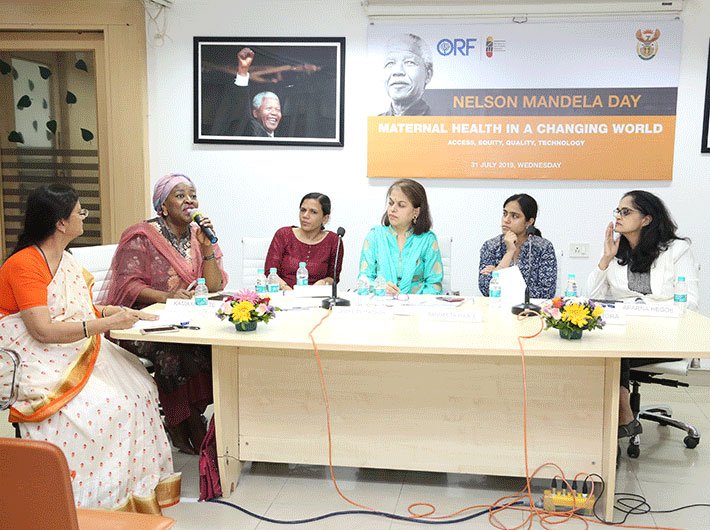India’s partially educated women and trained health workers bringing down maternal mortality
Despite making remarkable progress in maternal and child health, recognition of sexual and reproductive rights of women and adolescent girls in India remain negligible. Studies conducted across and the world and in India point out that women want to regulate their fertility, spread their pregnancies and limit the number of babies but are denied the chance to make a choice and end up having more children than desired at much younger age.
To mark the Nelson Mandela Day, ORF Mumbai and South African Consulate held a panel discussion on ‘Maternal Health in a Changing World.’ The consul general, Republic of South Africa in Mumbai, Maropene Ramokgapa said that South Africa is one of the few countries to achieve their MDGs. Primary health care in South Africa is free for those who cannot afford it. As part of the school curriculum reproductive and general health matters are also taught.
“Much can be done to keep young girls at school and also contribute to the economy so that they become part of the value chain of the production of sanitary towels, so that that can be distributed easily anywhere in society. In South Africa most young girls drop out of school because at the time of menstrual cycle they do not have access to sanitary towels and they sometimes miss school for 4-7 days. If they are not educated it stops them from participating in the economic growth. Following the UK example in Kenya, we have decided to give free sanitary towels to young women. In India on July 18, Nelson Mandela Day, along with NGOs we provide sanitary napkins to the needy,” said Ramokgapa.
“ Despite India having the second highest rate of maternal mortality in the world work, done by partially educated women like anganwadi workers and trained health workers like ASHAs in providing essential obstetrics care has brought ground-breaking results by bringing down mortality rates. These women workers have taken entire pillar of equity on the heads,” said Kamaxi Bhate, member secretary, MCGM's Savitribai Phule Gender Resource Center and former professor and head of preventive and social medicine at the KEM Hospital. She added that the private sector, that is, the NGOs have contributed in training and supporting these community health workers.
Bhate pointed that parents in our country do not think that their growing children need to know about ethics and sexuality, like changes during growing years, sexual relations based on mutual trust and love, use of contraception, safe sexual practices or prevention of sexually transmitted diseases -- they only want their daughters to be married off at the earliest.
Speaking on poor investment in public health, Dr. Sangeeta Pikale, director, Maharashtra Health Sector Skill Council, said not enough is invested in public health and the rest of the total investment goes to private sector which has led to proliferation of private health care. The moment private sector comes into health, it is becomes for profit organization when health and education becomes for-profit. The equation of equity, accessibility, accreditation and quality becomes unhealthy and compromised.
“Parameters in maternal health like average stay, morbidity, average use of antibiotics, blood loss etc are absolutely non-existent in data collation,” said Pikale, adding that while our population numbers are large our data is significantly less, and we have to look at our governance policies. Health is a state issue. The states adopt and modify national health policy as per their own requirements.
Pikale also said that while our abortion law protects women, patriarchal society and prejudices are limiting factors. There is a significant gap in the manner health is envisioned for the entire country and delivered on ground at the state level. Emphasising that along with their training and assessment parameters it is important to incentivize doctors to go to smaller places, she said that with Maharashtra having the first paramedical council allied healthcare providers are now certified.
Dr Aparna Hedge, founder, ARMMAN and Center for Uro gynecology and Pelvic Health, said that there is too much focus on delivery and all through pregnancy and infancy mothers are not taken care of and high risk factors are not picked up in time. A dying mother ends up in hospital. We have to go from hospitals to community and design scaled programmes.



